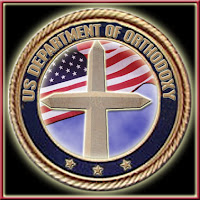 Being in seminary and studying all the “heretics” of history makes me sympathize with them. I rarely agree with them, but you learn to appreciate the fact that they were trying to be faithful to the Scriptures and trying to faithfully respond to their own historic context and situation.
Being in seminary and studying all the “heretics” of history makes me sympathize with them. I rarely agree with them, but you learn to appreciate the fact that they were trying to be faithful to the Scriptures and trying to faithfully respond to their own historic context and situation.For example, Pelagius was trying to respond to the moral laxity he saw in Rome. He saw statements of Augustine that said we could do nothing but sin (non posse non peccare) and thought this was perhaps the reason for the laxity. (If we are not able not to sin, then what is our motivation to even try?) Therefore, he reacted by saying that it was indeed possible not to sin (posse non peccare). And Pelagius easily found some support for his position in the Bible. After all, there are several people in the Old Testament who are called righteous and even blameless. Genesis 4:7 seems to imply that we can “master” our sin. And Jesus tells us to “be perfect” which, Pelagius thought, implies the possibility of perfection.
I’m not a Pelagian. I think there are major problems with Pelagianism. (For example, it was hard for Pelagius to recognize the uniqueness of Christ.) But I can sympathize with him and don’t even know if he was rightly called a heretic given his historic setting.
There is a tendency for us to define Orthodoxy in a very narrow way – which is itself based on our Western worldview. I don’t think this is helpful. It doesn’t recognize that the gospel is always contextualized and enculturated. It doesn’t recognize that there are multiple voices in the church and in the Bible itself. And it doesn’t recognize revelation as a process carried out in the progression of history.
The move towards a narrow orthodoxy is always a historical trend. What is defined as orthodox generally begins with a broad definition and then slowly narrows based on the context and those who hold the most power. For example, take three of the most prominent early church fathers – Tertullian, Origen, and Irenaeus. Their theologies were drastically different, yet all were considered orthodox. Taking their views of Scripture as an example, Tertullian viewed Scripture as a literal historic text in which most of the Old Testament was prophecy about the New Testament (and the New Testament in turn was prophecy about the church), Origen primarily viewed Scripture in terms of allegory, and Irenaeus viewed the Bible as a progressive history and typology which pointed towards the Kingdom of God. However, if you look a few hundred years later, you find only Tertullians view in the mainline church. Origen is found in some of the church mystics, and Irenaeus was abandoned altogether (until modern “liberals” began to look more seriously at his theology). The definition of orthodoxy gradually narrowed so much that the earliest defenders of orthodoxy were no longer even considered orthodox.
I think we would be better served by thinking in terms of a broad orthodoxy, realizing that there are several issues that the Bible doesn’t clearly define. And, when we get into those, less clearly defined issues, we ought to not be
 overly dogmatic.
overly dogmatic.Hmm… I have no concluding remarks…
Here is a picture I took of a door in Prague!
No comments:
Post a Comment